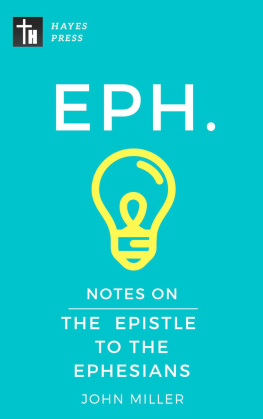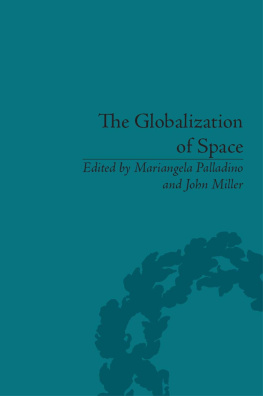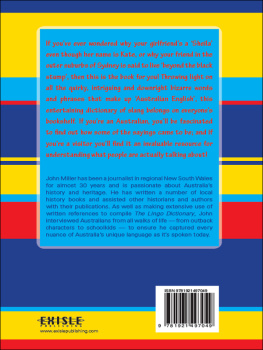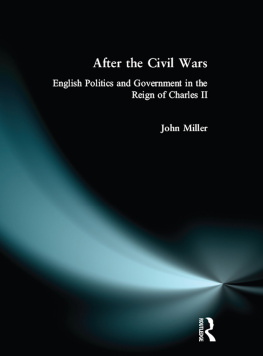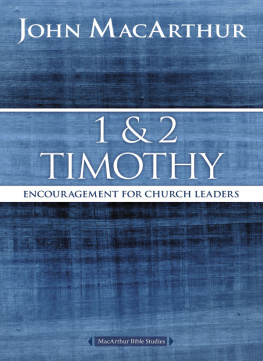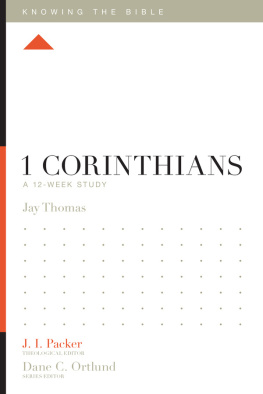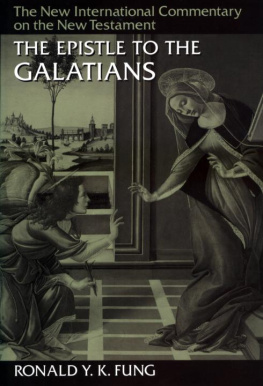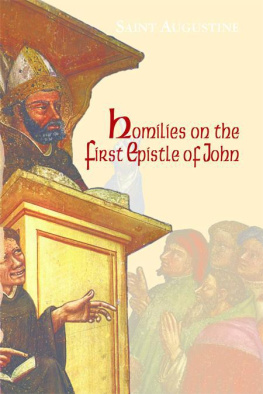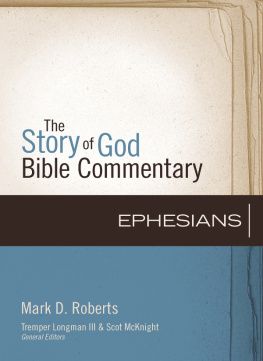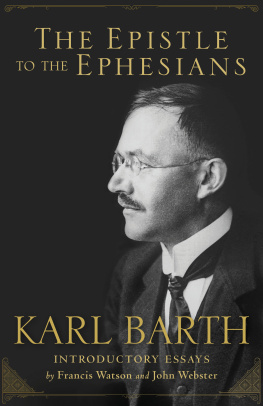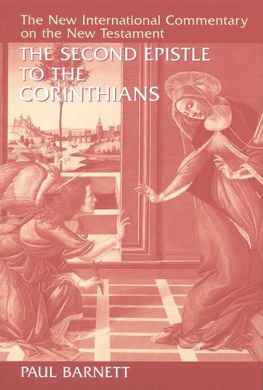NOTES ON THE EPISTLE TO THE EPHESIANS
JOHN MILLER
Copyright Hayes Press 2018
All rights reserved. No part of this book may be reproduced, stored in a retrieval system, or transmitted in any form, without the written permission of Hayes Press.
Published by:
HAYES PRESS
The Barn, Flaxlands
Royal Wootton Bassett
Swindon, SN4 8DY
United Kingdom
www.hayespress.org
Unless otherwise indicated, all Scripture quotations are from the Revised Version, 1885 (RV, Public Domain). Scriptures marked KJV are from the King James Version, 1611 (Public Domain).
PAULS LETTER TO THE EPHESIANS: WHEN AND WHERE WRITTEN (W. BUNTING)
T here can be no doubt that this is one of the prison epistles. Three times the apostle refers to himself as a prisoner. I Paul, the prisoner of Christ Jesus in behalf of you Gentiles (Eph.3:1); I therefore, the prisoner in the Lord, beseech you to walk worthily of the calling wherewith ye were called (Eph.4:1). When writing of the mystery of the gospel, the apostle states, For which I am an ambassador in chains (Eph.6:20).
It will be observed from the marginal note in the Revised Version that some doubt exists as to the words at Ephesus in the opening verse. Some very ancient authorities omit these words. The view has been advanced that this was a circular letter, and copies may also have gone to other churches. If this were so, we would have expected to find it addressed to the churches in Asia.
We know from Acts 20:31 that Paul spent three years in Ephesus, and during that period he must have built up an intimate knowledge of the saints in that city. In his letter, he does not mention one. Indeed, the only person mentioned is Tychicus, the beloved brother and faithful minister in the Lord, whom the apostle sent to make known all things regarding his state. The same brother was sent to Colossae (Col.4:8).
Being chained to a Roman soldier, and in close contact with the Roman Legions, may have influenced the apostle as he wrote in detail of the armour of God (Eph.6:10-18).
COMMENTARY ON EPHESIANS 1
E ph.1:1
Not of Jesus Christ, as in AV/KJV (but in 1 Cor.1:1 we have, Called an apostle of Jesus Christ; also Rom.1:1, a servant of Jesus Christ). See 1 Cor.1:1: In Gal.1:1 he puts special emphasis on the divine character of his apostleship. not from men, neither through man, but through Jesus Christ and God the Father. See Col.1:2, To the saints and faithful brethren. Alford says, The omission of the article before pistois (faithful) shews that the same persons are designated by both adjectives; thus faithful conveys the same thought as if we were to call the faithful believers. Note the distinction in Philippians where Paul addressed the saints ... with the bishops and deacons (Phil.1:1).
Eph.1:2
This is the customary apostolic salutation. Peace was the greeting of the Hebrew (1 Sam.25:6; 1 Chron.12:18), to which the New Testament salutation of grace is prefixed.
Eph.1:3
Paul strikes a note of eulogy or praise to God, not as Abrahams God, nor as Jehovah, Israels God, but to the God and Father of our Lord Jesus Christ, who is thus described as the One to be praised in this dispensation. The God of our Lord Jesus Christ bespeaks the humanity of Christ. He who as Jehovahs Servant had a God to whom He was entirely devoted, whom He adored and served. His God is also His Father; this tells of a divine begetting, and of the ineffable relationship which exists between the Father and the Son. Not one who became the Son of God in time, For God sent not the Son into the world to judge the world; but that the world should be saved through Him (Jn 3:17), but One who was the Son of God ere He came into the world. The Father hath sent the Son to be the Saviour of the world (1 Jn 4:14). God is also our God and our Father (Jn 20:17), but the One we bless (praise) is the God and Father of our Lord Jesus Christ. See 2 Cor.1:3 and 1 Pet.1:3 for other reasons why God is praised.
The word Eulogia = blessing is used three times in verse 3 in different ways. I, in praising God, II, in God pronouncing or conferring blessing, III, and of the spiritual blessing bestowed. See , where Melchizedeck is shown blessing (praising) God and also bestowing, in the name of God Most High, blessing upon Abram. In Christ, defines the heavenlies where we and our blessings are. We also read of the heavenlies where spiritual hosts of wickedness still lodge (Eph.6:12). Spiritual blessings are the things of the Spirit of God (1 Cor.2:14), which are revealed through the Spirit to the spiritual. (Comp. 1 Cor.2:9-16). In contrast to these spiritual things Israel in the land enjoyed all earthly blessings in a land which flowed with milk and honey. These earthly and material things were for the natural comfort and enjoyment of Israel after the flesh, but the natural man receiveth not the things of the Spirit of God. To be diligent to understand our blessings is our privilege and responsibility, for God has blessed us with every spiritual blessing.
Eph.1:4
The blessing of God is based upon His election. He chose us out of the world; He made a choice; He chose us in Christ. Israel was chosen in Abraham. The promises were made to Abraham and his seed, even before Israel was born. But in our case long millenniums rolled across the sea of ages between the choice of God and its realization. We were chosen before the foundation of the world. This views the believer as eternally set apart and without blemish through the work of Christ, and that in a state of eternal love, that the love wherewith Thou lovedst Me may be in them, and I in them (Jn 17:26). Every state of earthly love is rendered impure, because of the unholy state of the human heart through sin; thus love is fouled at its fountain. But here is a state of abiding purity and holiness in the sweetest and best of all emotions love. The saint is holy and unblemished before God in love, without fear, sorrow, or shame. What was lost through the fall is restored to Gods chosen ones through grace. What we are should find expression in what we do, and even now a saintliness of behaviour in Christian affection should be manifested.
Eph.1:5
God who chose has predestined or marked out beforehand His saints to adoption, that is, to be given the place of sons (adoption as sons: Gk. huiothesia : huios = a son; This which comes from Gk. tithemi = to place, put, set, etc.). Those who are sons ().
Eph.1:6
He freely bestowed or made us objects of His grace; in the Beloved is the term of endearment by which God describes His Son. In Col.1:13 He speaks of the Son of His love, a somewhat similar description. It is because of His Beloved that God has lavished such abundance of grace upon the saints.
Next page
